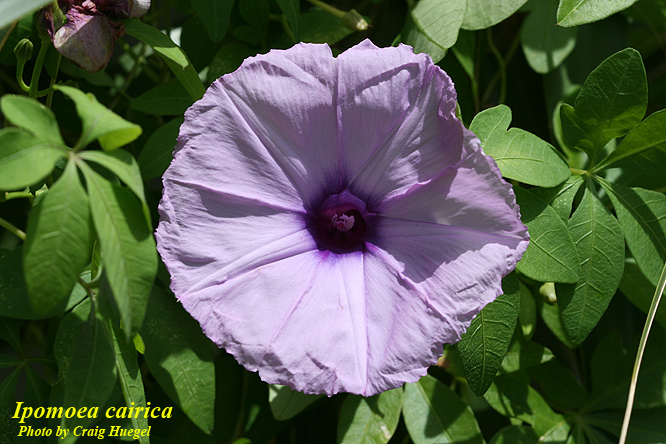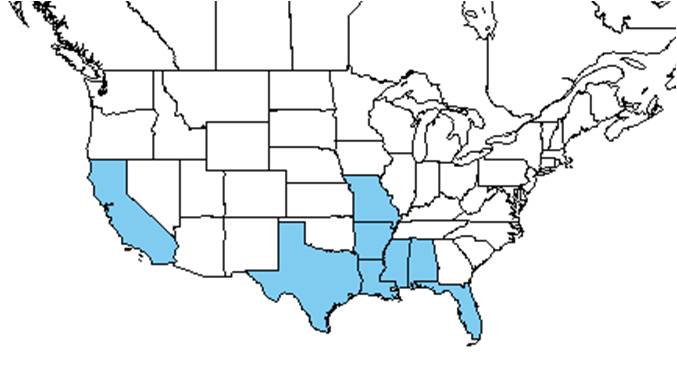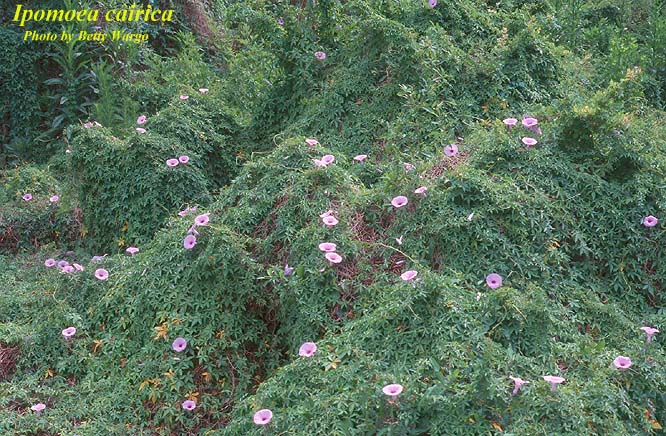Difference between revisions of "Ipomoea cairica"
HaleighJoM (talk | contribs) (→Ecology) |
|||
| (9 intermediate revisions by 5 users not shown) | |||
| Line 4: | Line 4: | ||
| name = Ipomoea cairica | | name = Ipomoea cairica | ||
| image = Ipom_cairi.jpg | | image = Ipom_cairi.jpg | ||
| − | | image_caption =Photo by Craig Huegel, [http://www.florida.plantatlas.usf.edu/ Default.aspx Atlas of Florida Vascular Plants] | + | | image_caption =Photo by Craig Huegel, [http://www.florida.plantatlas.usf.edu/Default.aspx Atlas of Florida Vascular Plants] |
| regnum = Plantae | | regnum = Plantae | ||
| divisio = Magnoliophyta - Flowering plants | | divisio = Magnoliophyta - Flowering plants | ||
| Line 18: | Line 18: | ||
}} | }} | ||
| − | Common | + | Common names: Mile-a-minute vine, Cairo morning glory |
==Taxonomic notes== | ==Taxonomic notes== | ||
| + | Synonyms: none.<ref name="weakley">Weakley, A.S. 2015. Flora of the southern and mid-atlantic states. Working Draft of 21 May 2015. University of North Carolina at Chapel Hill, Chapel Hill, North Carolina.</ref> | ||
| + | |||
| + | Varieties: none.<ref name="weakley">Weakley, A.S. 2015. Flora of the southern and mid-atlantic states. Working Draft of 21 May 2015. University of North Carolina at Chapel Hill, Chapel Hill, North Carolina.</ref> | ||
| + | |||
==Description== | ==Description== | ||
<!-- Basic life history facts such as annual/perrenial, monoecious/dioecious, root morphology, seed type, etc. --> | <!-- Basic life history facts such as annual/perrenial, monoecious/dioecious, root morphology, seed type, etc. --> | ||
==Distribution== | ==Distribution== | ||
| + | This plant is a native of Africa. In the United States, it is found in Alabama and Florida.<ref name="weakley">Weakley, A.S. 2015. Flora of the southern and mid-atlantic states. Working Draft of 21 May 2015. University of North Carolina at Chapel Hill, Chapel Hill, North Carolina.</ref> | ||
| + | |||
==Ecology== | ==Ecology== | ||
<!--===Habitat===--> <!--Natural communities, human disturbed habitats, topography, hydrology, soils, light, fire regime requirements for removal of competition, etc.--> | <!--===Habitat===--> <!--Natural communities, human disturbed habitats, topography, hydrology, soils, light, fire regime requirements for removal of competition, etc.--> | ||
| − | + | ===Phenology=== <!--Timing off flowering, fruiting, seed dispersal, and environmental triggers. Cite PanFlora website if appropriate: http://www.gilnelson.com/PanFlora/ --> | |
| + | It has been observed flowering in May.<ref>Nelson, G. [http://www.gilnelson.com/ PanFlora]: Plant data for the eastern United States with emphasis on the Southeastern Coastal Plains, Florida, and the Florida Panhandle. www.gilnelson.com/PanFlora/ Accessed: 12 DEC 2016</ref> | ||
<!--===Seed dispersal===--> | <!--===Seed dispersal===--> | ||
<!--===Seed bank and germination===--> | <!--===Seed bank and germination===--> | ||
<!--===Fire ecology===--> <!--Fire tolerance, fire dependence, adaptive fire responses--> | <!--===Fire ecology===--> <!--Fire tolerance, fire dependence, adaptive fire responses--> | ||
===Pollination=== | ===Pollination=== | ||
| − | The following Hymenoptera families and species were observed visiting flowers of ''Ipomoea cairica'' at Archbold Biological Station | + | The following Hymenoptera families and species were observed visiting flowers of ''Ipomoea cairica'' at Archbold Biological Station:<ref name="Deyrup 2015">Deyrup, M.A. and N.D. 2015. Database of observations of Hymenoptera visitations to flowers of plants on Archbold Biological Station, Florida, USA.</ref> |
Halictidae: ''Agapostemon splendens, Augochlora pura'' | Halictidae: ''Agapostemon splendens, Augochlora pura'' | ||
Megachilidae: ''Megachile georgica'' | Megachilidae: ''Megachile georgica'' | ||
| − | <!--=== | + | <!--===Herbivory and toxicology===--> <!--Herbivory, granivory, insect hosting, etc.--> |
<!--===Diseases and parasites===--> | <!--===Diseases and parasites===--> | ||
| − | ==Conservation and | + | ==Conservation, cultivation, and restoration== |
| − | == | + | |
| + | ==Cultural use== | ||
==Photo Gallery== | ==Photo Gallery== | ||
<gallery widths=180px> | <gallery widths=180px> | ||
| Line 47: | Line 55: | ||
==References and notes== | ==References and notes== | ||
| − | |||
Latest revision as of 16:27, 13 July 2022
| Ipomoea cairica | |
|---|---|

| |
| Photo by Craig Huegel, Atlas of Florida Vascular Plants | |
| Scientific classification | |
| Kingdom: | Plantae |
| Division: | Magnoliophyta - Flowering plants |
| Class: | Magnoliopsida - Dicotyledons |
| Order: | Solanales |
| Family: | Convolvulaceae |
| Genus: | Ipomoea |
| Species: | I. cairica |
| Binomial name | |
| Ipomoea cairica (L.) Sweet | |

| |
| Natural range of Ipomoea cairica from USDA NRCS Plants Database. | |
Common names: Mile-a-minute vine, Cairo morning glory
Contents
Taxonomic notes
Synonyms: none.[1]
Varieties: none.[1]
Description
Distribution
This plant is a native of Africa. In the United States, it is found in Alabama and Florida.[1]
Ecology
Phenology
It has been observed flowering in May.[2]
Pollination
The following Hymenoptera families and species were observed visiting flowers of Ipomoea cairica at Archbold Biological Station:[3]
Halictidae: Agapostemon splendens, Augochlora pura
Megachilidae: Megachile georgica
Conservation, cultivation, and restoration
Cultural use
Photo Gallery
Vine and flowers of Ipomoea cairica Photo by Betty Wargo, Atlas of Florida Vascular Plants
References and notes
- ↑ 1.0 1.1 1.2 Weakley, A.S. 2015. Flora of the southern and mid-atlantic states. Working Draft of 21 May 2015. University of North Carolina at Chapel Hill, Chapel Hill, North Carolina.
- ↑ Nelson, G. PanFlora: Plant data for the eastern United States with emphasis on the Southeastern Coastal Plains, Florida, and the Florida Panhandle. www.gilnelson.com/PanFlora/ Accessed: 12 DEC 2016
- ↑ Deyrup, M.A. and N.D. 2015. Database of observations of Hymenoptera visitations to flowers of plants on Archbold Biological Station, Florida, USA.
